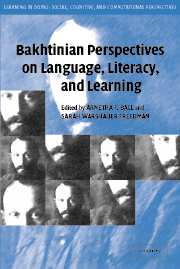Book contents
- Frontmatter
- Contents
- List of Contributors
- Acknowledgments
- PART I IDEOLOGIES IN DIALOGUE: THEORETICAL CONSIDERATIONS
- PART II VOICED, DOUBLE VOICED, AND MULTIVOICED DISCOURSES IN OUR SCHOOLS
- PART III HETEROGLOSSIA IN A CHANGING WORLD
- 9 New Teachers for New Times: The Dialogical Principle in Teaching and Learning Electronically
- 10 Is Contradiction Contrary?
- 11 A Bakhtinian Perspective on Learning to Read and Write Late in Life
- 12 New Times and New Literacies: Themes for a Changing World
- Voices in Dialogue – Hybridity as Literacy, Literacy as Hybridity: Dialogic Responses to a Heteroglossic World
- PART IV A CLOSING THOUGHT ON BAKHTINIAN PERSPECTIVES
- Author Index
- Subject Index
- Titles in the series
- References
11 - A Bakhtinian Perspective on Learning to Read and Write Late in Life
Published online by Cambridge University Press: 24 May 2010
- Frontmatter
- Contents
- List of Contributors
- Acknowledgments
- PART I IDEOLOGIES IN DIALOGUE: THEORETICAL CONSIDERATIONS
- PART II VOICED, DOUBLE VOICED, AND MULTIVOICED DISCOURSES IN OUR SCHOOLS
- PART III HETEROGLOSSIA IN A CHANGING WORLD
- 9 New Teachers for New Times: The Dialogical Principle in Teaching and Learning Electronically
- 10 Is Contradiction Contrary?
- 11 A Bakhtinian Perspective on Learning to Read and Write Late in Life
- 12 New Times and New Literacies: Themes for a Changing World
- Voices in Dialogue – Hybridity as Literacy, Literacy as Hybridity: Dialogic Responses to a Heteroglossic World
- PART IV A CLOSING THOUGHT ON BAKHTINIAN PERSPECTIVES
- Author Index
- Subject Index
- Titles in the series
- References
Summary
Before we didn't go to school … nobody called us, nobody pushed us, nobody said study, it's necessary.
– Carmen, age 64Work in the area of adult literacy education in peripheral nations has been dominated by the search for the right method, the implementation of school-like programs adapted for adults, or the explanation of adult educational services' failures to provide quality learning opportunities to underschooled adults (Rivera, 1994; Schmelkes & Kalman, 1996). Little effort has been made to understand what becoming literate or further developing literacy knowledge and know-how entails for a person once they are beyond school age. Some researchers have pointed out that the reading and writing itself is often secondary to other interests, such as opportunities to socialize with others, the need to make a living, or care for one's children (Garcia-Huidoro, 1994; Rockhill, 1993; Stromquist, 1997). Recent international studies (Organization for Economic Cooperation and Development, 1995; Infante, 2000) look at literacy in terms of individual mastery, emphasizing what Wagner (2001) calls the cognitive abilities of reading, writing, and calculating. They study knowledge about literacy with large standardized test materials, similar to school-type evaluations, placing adults' performances within predetermined literacy levels. Even on those test items having to do with so called “real-life” situations, such as writing a check, filling out a form or reading a newspaper, they approach evaluating literacy in terms of skills and abilities similar to evaluation tools of schooling.
Information
- Type
- Chapter
- Information
- Bakhtinian Perspectives on Language, Literacy, and Learning , pp. 252 - 278Publisher: Cambridge University PressPrint publication year: 2004
References
Accessibility standard: Unknown
Why this information is here
This section outlines the accessibility features of this content - including support for screen readers, full keyboard navigation and high-contrast display options. This may not be relevant for you.Accessibility Information
- 4
- Cited by
